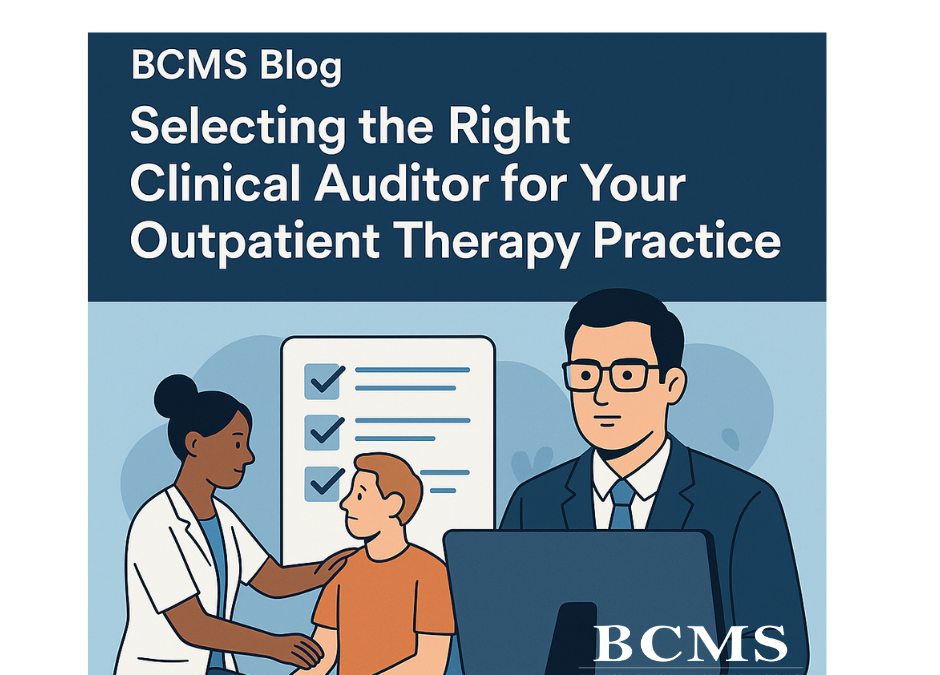Selecting the Right Clinical Auditor for Your Outpatient Therapy Practice
In today’s outpatient therapy landscape, the rapid adoption of technology, including cutting-edge AI services, is transforming practice operations. Among the least favored responsibilities for therapists is documentation, a task that often competes with the core mission of enhancing patient well-being. Given the choice between treating patients and documenting those interventions, the overwhelming preference (approaching 100%) leans toward direct patient care. This underscores a growing need for technological solutions to alleviate this burden.
This isn’t just anecdotal. A 2024 study published in the Journal of the American Medical Informatics Association found that outpatient rehabilitation therapists experience documentation burdens similar to those reported by physicians and nurses. The study revealed that manual data entry and administrative documentation “inhibit clinical care and reduce time available for patient treatment,” underscoring that therapists overwhelmingly prefer time spent with patients over paperwork (Schwartz-Dillard et al., 2024).
Electronic Medical Records (EMRs) and AI tools are becoming increasingly sophisticated, streamlining time-intensive tasks such as creating home exercise programs (HEPs) and automating note generation through conversation recording. Billing practices have also evolved, offering enhanced automation and diverse coding support. These advancements are a boon for a profession that high productivity demands and declining payer reimbursements have strained. However, technology alone cannot eliminate all documentation challenges. Even with reduced error rates, assuming optimal utilization, significant inaccuracies may persist, potentially jeopardizing audit outcomes.
This raises a critical question for practice owners: How can documentation practices be ensured to meet regulatory standards? The answer, consistent over the decades, lies with provider knowledge and the utilization of chart audits to quantitatively assess documentation and billing strengths and weaknesses. Yet, a further consideration emerges: Are internal audits sufficient, or is investing in an external third-party audit program more advantageous? Internal reviewers often lack the resources and objectivity required for thorough peer assessments, exposing practices to unforeseen financial liabilities and sanctions. Engaging an external auditor enables early detection and remediation of such risks. If external audits are deemed necessary, the challenge becomes selecting the right partner. Below, we outline the key criteria for choosing an external auditor and highlight why BCMS stands out as the premier choice for your team.
Discipline-Specific Expertise
The alignment of auditor expertise with the clinic’s billing and documentation requirements is paramount. Because physical therapists and occupational therapists traditionally treat patients with the same diagnoses, using common techniques and interventions, it would be appropriate for either professional to audit the other; however, speech-language pathologists focus on distinctly different diagnostic categories with very different interventions, and as such, should be audited by an SLP auditor.
At BCMS, the audit team comprises highly experienced therapists, ensuring discipline-specific audits tailored to reflect the unique documentation and billing regulations of each specialty.
Extensive Experience
Selecting a clinical auditor requires evaluating both documentation and auditing proficiency. BCMS brings over 20 years of therapy-specific audit and appeal expertise. Our auditors must possess 3-5 years of experience in therapy audits and at least 5 years of clinical practice. New auditors undergo a 90-day internal orientation with oversight, followed by peer-reviewed supervision for 100 audits, guaranteeing precision and reliability.
Vetted and Current Resources
Federal regulations evolve annually, with recent updates affecting therapy-specific areas, including assistant supervision, alternative payment models, billing/coding adjustments, and documentation certification. A reputable auditor must remain current with these changes. BCMS continuously updates its resources and references, ensuring audits reflect the latest regulatory standards.
Quantified Outcome Data
Traditional audits often rely on binary scoring (present or absent), which lacks depth and nuance. BCMS employs a proprietary system assigning numeric values to documentation and billing regulations based on risk levels. These values generate individualized scorecards based on vulnerability risks, supporting performance recognition, incentive bonuses, corrective actions, and educational initiatives.
Professional Prominence
Experience often correlates with industry recognition. When selecting an auditor, consider those with national stature. BCMS is frequently invited to present at state and national events on topics such as audits, appeals, documentation, coding, billing, fraud, and abuse, reflecting our leadership in the field.
Comprehensive Reporting and Conferences
Effective audits provide actionable insights for informed decision-making. BCMS delivers detailed clinic and corporate-wide Executive Reports, line-item audits, and therapist-specific scorecards, offered verbally and in writing to empower managers and owners.
Responsiveness to Clients
Just as consumers research product reviews, healthcare providers should evaluate auditor ratings. BCMS boasts an extensive portfolio of client testimonials praising its Off-Site Audit Program, support during payer audits or record requests, and denial appeal assistance, underscoring our commitment to excellence.
Audit Capacity
Whether your practice operates 1-5 sites or scales to 400+, you need confidence in an auditor’s capacity. BCMS has proven expertise in managing audits across small, medium, and large clinic networks, ensuring timely and thorough reviews.
Conclusion
In an era where technology transforms outpatient therapy practices, the selection of a competent clinical auditor remains a cornerstone of compliance and operational success. At BCMS, we recognize the unique challenges faced by therapy providers and offer a robust Off-Site Audit Program designed to address these complexities with discipline-specific expertise, extensive experience, and actionable insights. By partnering with BCMS, your practice can navigate regulatory demands, mitigate financial risks, and enhance patient care quality. Contact us today at (713) 352-0113 or visit bcmscomp.com to leverage our tailored solutions and ensure your documentation practices meet the highest standards.
About BCMS
BCMS is a trusted leader in healthcare compliance, delivering specialized audit and regulatory solutions for outpatient therapy providers. Stay informed with our latest insights at bcmscomp.com/blog.
Disclaimer: This blog is for informational purposes only and does not constitute legal advice. Consult a compliance professional for specific guidance.

